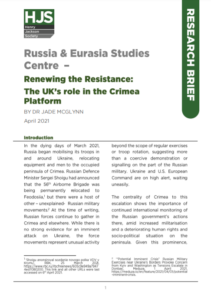‘Renewing the Resistance: The UK’s role in the Crimea Platform’
By Dr Jade McGlynn, Director of Research
April 2021
Introduction:
“In the dying days of March 2021, Russia began mobilising its troops in and around Ukraine, relocating equipment and men to the occupied peninsula of Crimea. Russian Defence Minister Sergei Shoigu had announced that the 56th Airborne Brigade was being permanently relocated to Feodosiia, but there were a host of other – unexplained- Russian military movements. At the time of writing, Russian forces continue to gather in Crimea and elsewhere. While there is no strong evidence for an imminent attack on Ukraine, the force movements represent unusual activity beyond the scope of regular exercises or troop rotation, suggesting more than a coercive demonstration or signalling on the part of the Russian military. Ukraine and U.S. European Command are on high alert, waiting uneasily.
The centrality of Crimea to this escalation shows the importance of continued international monitoring of the Russian government’s actions there, amid increased militarisation and a deteriorating human rights and socio-political situation on the peninsula. Given this prominence, Crimea must also be at the heart of discussions over how to counter ongoing Russian aggression – not just part of the backstory.
In October 2020, the UK and Ukraine signed a detailed Political, Free Trade and Strategic Partnership Agreement (henceforth Strategic Partnership Agreement) that covered security issues as well. But all sides agreed that the agreement, while most welcome, was intended as a springboard and not a limit to UK-Ukrainian partnership. With an eye to expanding this collaboration, Ukrainian Foreign Minister Dmytro Kuleba invited Great Britain to participate in the Crimea Platform while in London to sign the agreement. Amid the uncertainty of the prospects of the Normandy format and the Minsk negotiating process, which are unlikely to expand any time soon, and taking into account the UK government’s willingness to play a global role in the Baltic-Black Sea region, this briefing will argue that the next step is for the UK to not only accept Mr Kuleba’s invitation but to also play a leading role in the de-occupation process and in championing the Crimea Platform.”
About the Author:
Dr Jade McGlynn, Director of Research
 Dr Jade McGlynn is the Director of Research at the Henry Jackson Society, where she previously worked as a Research Fellow specialising in Russian political culture and foreign relations. Prior to joining HJS, Jade worked as a Lecturer and Researcher at the University of Oxford.
Dr Jade McGlynn is the Director of Research at the Henry Jackson Society, where she previously worked as a Research Fellow specialising in Russian political culture and foreign relations. Prior to joining HJS, Jade worked as a Lecturer and Researcher at the University of Oxford.
Jade holds a DPhil in Russian from the University of Oxford, where she also gained her BA in Russian and Spanish. She also has a Masters by Research in Russian and East European Studies from the University of Birmingham. Jade has published in various media outlets, leading academic journals, think tank reports, and collected volumes, and she is currently finalising a manuscript on the politics of memory in Putin’s Russia.
Outside of academia, Jade has worked in international marketing roles across Russia and Eastern Europe, managing teams across several time zones. She lived and worked in Russia for five years and has also worked and held research fellowships in Spain, Serbia, the USA, and Ukraine. As well as fluent Russian, Jade speaks Spanish, French, Serbian, and Ukrainian, with limited proficiency in German.



